Geneva Accord maps out new road to peace
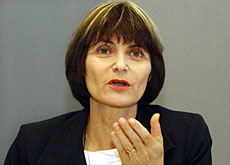
A Swiss-backed peace plan for the Middle East is to be signed in Geneva on December 1, amid opposition from the Israeli government.
The Swiss foreign minister, Micheline Calmy-Rey, told swissinfo the accord was not a substitute for the “road map” but could provide a new impetus for peace.
The “Geneva Accord” was signed by a former Israeli cabinet minister, Yossi Beilin, and his Palestinian counterpart, Yasser Abed Rabbo, in Jordan on October 12, following two years of secret negotiations.
The signing ceremony in Geneva on December 1 will be a symbolic event, and comes after a campaign to promote the accord among Israelis and Palestinians.
The Israeli government is firmly opposed to the plan – the prime minister, Ariel Sharon, insists that the United States-backed “road map” is the only route to peace in the Middle East.
The accord covers many divisive issues between Israelis and Palestinians: Jerusalem, a Palestinian state, the right of return for Palestinian refugees and Jewish settlements.
swissinfo: How did this process start, and what was the motivation for Switzerland’s involvement?
Micheline Calmy-Rey: Switzerland got involved at the request of the groups concerned. We support political dialogue between personalities from civil society, both Israeli and Palestinian. And this is part of Switzerland’s commitment to peace promotion measures. We are pursuing such measures in many other countries in the world and it’s not the only country where we are going to promote peace.
swissinfo: Switzerland has been involved right from the start then in a supporting role?
M.C-R.: Yes, but Switzerland did not have any influence on the substance [of the accord]. The Swiss support was logistical and financial… because we support political dialogue, and we did not provide mediation. We didn’t make compromises – the compromises were made by the parties themselves.
swissinfo: How exactly did the facilitator’s role work, what services did Switzerland provide?
M.C-R.: Financial and logistical support – we made this political dialogue possible. And you know this commitment to peace promotion [is something] we are doing in other countries too. Sometimes this takes the form of facilitation, as in the Geneva Accord, but sometimes other means are used. For example, good offices or provision of expert services, or… well, there’s a whole list of those sorts of actions.
swissinfo: You’ve been very open about peace promotion on many occasions. Do you see this as a fundamental part of Swiss foreign policy, particularly bearing in mind that Switzerland is a neutral country?
M.C-R.: Switzerland’s commitment to peace promotion is an important part of our foreign policy. Because of that the groups concerned came and asked for Switzerland’s support – because we are not involved in strategic discussions in the country, because we are neutral, because our support is not provocative, if I can put it like that.
swissinfo: Do you feel Swiss neutrality is an important factor – an advantage that Switzerland has?
M.C-R.: I think it was an advantage in this case, but it’s not an exclusive advantage. Competence and credibility are advantages too, and I think if we had not had competence and credibility they would not have asked for our support.
swissinfo: You have been to Britain and the United States recently, where you were looking for support for the Geneva Accord. What sort of reaction did you get?
M.C-R.: I think the reaction has been on the whole positive. Take the example of Israel first – 39 per cent of the population, of the Israeli people, are in favour, according to a survey.
In Britain the prime minister and the foreign minister publicly welcomed this initiative. In America, some reactions were neutral ones, and others recognised the merit of this initiative [such as US Secretary of State] Colin Powell. I think this initiative has had quite positive reactions around the world.
swissinfo: How does the Swiss government view the accord? Is this a replacement for the [US-backed] road map, or something extra?
M.C-R.: It complements the road map. It answers questions that are not solved by the road map, so it could be considered a useful addition.
swissinfo: What about the Israeli government? The prime minister, Ariel Sharon, has refused even to accept a copy of the accord. What is your reaction? Is there anything you would like to say to him?
M.C-R.: It’s not my place to deliver any message. The only thing I want to underline is that this text is a kind of service given by the authors to the authorities, who may find themselves in a situation where the text might be useful to them. So it’s a service and that’s all, and that’s the only thing I want to underline.
swissinfo: Are you personally optimistic about this accord?
M.C-R.: Yes I am. You know, this text is a hope for peace. This text is a little light in the darkness, and I hope, I really hope, that it will be useful for peace.
The people who are now discussing together, who made these compromises; many of them have suffered from the conflict. Many of them have lost friends or loved ones, and it was very difficult for them to make compromises. It was very difficult to enter into that process and to go beyond the feelings one has in that situation, and to work with reason in order to find solutions. And I am very proud that Switzerland can support such a political dialogue, and I hope that this little light will be lasting.
swissinfo: What’s the next step after the signing ceremony in Geneva on December 1?
M.C-R.: The signing is a public commitment. [After that] the authors of the text will set about in explaining the text [to the Israeli and Palestinian populations], to defend the compromises they reached together, and in that way the ceremony in Geneva is not an end, it’s the beginning of the process.
swissinfo-interview: Imogen Foulkes
The Geneva Accord was brokered by Israeli and Palestinian opposition groups after two years of secret negotiations.
Information about the accord is being circulated to Israeli and Palestinian households in an effort to drum up support.
The Israeli government is firmly opposed to the accord, and Jewish groups have criticised Switzerland for “interfering” in internal Israeli affairs.
The United Nations Secretary General, Kofi Annan, and former US president, Jimmy Carter, have both expressed their backing for the accord.

In compliance with the JTI standards
More: SWI swissinfo.ch certified by the Journalism Trust Initiative
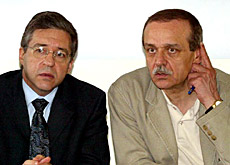
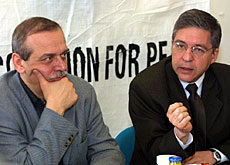
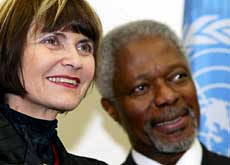
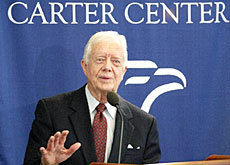
You can find an overview of ongoing debates with our journalists here. Please join us!
If you want to start a conversation about a topic raised in this article or want to report factual errors, email us at english@swissinfo.ch.